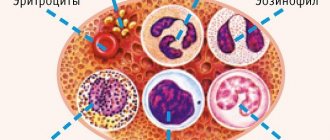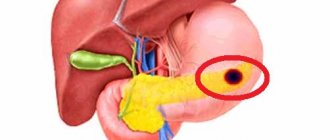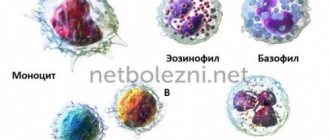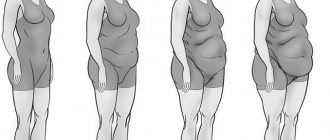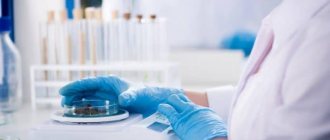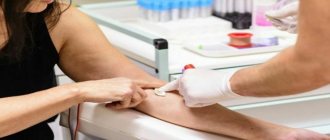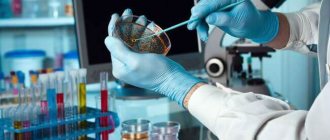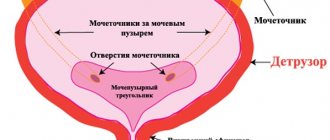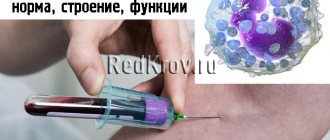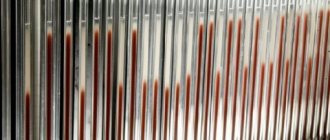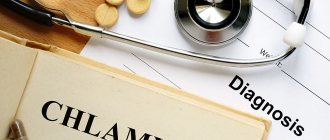The human body is capable of not only fighting various diseases on its own, but also remembering the “harmful agents” that it has encountered.
The result of this “experience” is the presence of specific proteins in the blood - antibodies. What is it and why are antibodies not only “useful”, but also “harmful”? Antibodies are specific globulins (immunoglobulins) that have an active site for capturing and neutralizing antigens.
The variety of antibodies in the blood makes it possible to judge what a person was ill with when, what he is currently ill with, and how well his immune system works. If immunoglobulins are elevated, it means that the body is responding to an attack by agents that entered naturally or were introduced on purpose.
Antibodies are formed:
- As a result of natural immunization - as a response to previous infections, attacks by genetically foreign proteins
- As a result of artificial immunization - as a response to vaccinations, weakened pathogenic agents specially introduced into the body
The child immunization system is built on the ability of the human body to remember pathogenic agents and quickly form an immune response to repeated attacks.
Immunoglobulins are able to remember and distinguish “their” antigens. They neutralize only those for which they were formed. This ability of antibodies is called complementarity.
What can you tell from antibodies?
The development of immunology has shown that antibodies can be distinguished not only by the degree of accumulation, but also by type. Five main varieties have been identified that react to certain microorganisms and foreign substances and their breakdown products. Therefore, a blood test for antibodies can help answer the questions:
- whether there are specific bacteria or viruses in the body;
- if any, then in what quantity (whether a person is considered infected or is it just protection);
- How fully does one’s own immunity respond to infection? Are additional medications needed?
- during an infectious disease, it is possible to determine the stage of the disease and predict the outcome;
- whether a person has antibodies in his blood that are markers for malignant cells if he is suspected of having cancer;
- how the mother’s body reacts to the fetus;
- how rapidly the process of engraftment of the transplanted organ or tissue proceeds after transplantation;
- what antigen causes the allergy?
The possibilities for using antibody detection in diagnostics continue to be studied. It is still not clear why, under the same conditions, one person suffers an acute illness, while another copes independently without any symptoms.
Autoantibodies
Autoantibodies are immune proteins that, unlike other globulins, are aimed at destroying the body’s own tissues. Their formation often occurs spontaneously, and it is impossible to determine the cause. More often they appear after infection.
Their formation occurs in autoimmune diseases - rheumatoid arthritis, sclerosis, systemic lupus erythematosus, infertility. In some cases, the appearance of autoantibodies occurs long before the development of disease symptoms.
Types of antibodies
In immunological laboratories, 5 types of antibodies are determined, they are called IgA, IgE, IgM, IgG, IgD. Each has an affinity for certain antigens.
- IgA - studied for diseases affecting the mucous membranes and skin (respiratory infections, chronic skin diseases), liver damage (hepatitis, cirrhosis, alcoholism);
- IgE - class indicates protection against common infections, the process of neutralizing toxins, fetal immunity during pregnancy;
- IgM are fast-response antibodies, they are responsible for the first encounter with a foreign agent;
- IgG - provide a long-term protective reaction, lasting immunity;
- IgD - this class has been little studied.
Types of antibodies to viruses
After infection with a virus, the immune system is activated: immunoglobulins (antibodies) are produced for each specific foreign object (antigen) that are able to neutralize it. In total, there are five classes of such antibodies in humans - IgG, IgA, IgM, IgD, IgE. Each of them plays a role in immunity. When analyzing for a viral infection, the two most important indicators are IgG and IgM. It is by them that the stage and degree of the disease is determined and the recovery process is monitored.
IgM is the first antibody produced by the body when infected with a virus. They appear during the acute stage of the disease, as well as during exacerbations of a chronic disease. For different viruses, the period of detection of IgM in the blood varies: for example, with ARVI, their number will reach a peak already in the first week, and with human immunodeficiency virus (HIV) or viral hepatitis - only 4-5 weeks after the alleged infection.
IgG are antibodies that are present in the blood at the stage of a long-term illness, recovery or chronic course during a period of remission. And if IgM lasts for several months, then IgG to some viruses can remain for life. Even when the infection itself has long been defeated.
It is the ratio of IgG and IgM indicators that allows the doctor to assess the person’s condition. In particular, assume how long the infection has been in the body. Possible combinations indicate the following:
- No IgM and IgG. The body has not encountered the virus, there is no immunity. This picture is not always a reason to calm down. A negative test for certain types of viruses puts a person at risk for primary infection. For example, this is relevant for those women who are planning a child. If you receive such results for rubella, mumps, chickenpox and other viruses, it is recommended to postpone pregnancy and get vaccinated.
- There is IgM, no IgG. Primary infection, acute stage of the disease.
- There is no IgM, there is IgG. A previous disease, less often a chronic form in remission. Acquired immunity.
- There are IgM and IgG. Chronic disease during the period of exacerbation or the end of the disease.
How to take a blood test for AT
To obtain reliable information, you need to properly prepare and donate blood for antibodies.
- 2-3 days before this, it is necessary to exclude from food everything fried, salty and fatty, coffee and sparkling water, alcohol in any form (this also applies to beer).
- If the patient has recently suffered an acute illness or is being treated with medications, the doctor will determine the optimal regimen before donating blood.
- One day before, you need to stop exercising. Do not perform physiotherapeutic procedures.
- You should come to the treatment room in the morning before breakfast, on an empty stomach. Blood is taken from a vein in the elbow; it is better to take care of appropriate clothing with loose sleeves.
The norm and interpretation of the analysis are shown in the table
| AT class | Standards in g/l | Promotion | Decline |
| IgA | for children – 0.16-2.6 for adults – 0.35-3.55 | tuberculosis, liver disease, cystic fibrosis, rheumatoid arthritis, suppurative processes in the stomach and intestines | consequences of taking medications, radiation, dermatitis, malignant anemia |
| IgG | for children – 7.4-13.6 for adults – 7.8-18.5 | tuberculosis, rheumatoid arthritis, lupus, sarcoidosis, HIV infection | allergies, muscular dystrophy, malignant tumors |
| IgM | for children – 0.7-1.4 for adult men – 0.5-2.4; for women – 0.8-2.9 | acute and chronic diseases of the digestive system, respiratory system, burns, parasitic infections, intrauterine infection of the fetus, lymphoma |
A referral for analysis is given by the attending physician, in which he directs the laboratory technicians to the reason for the diagnosis. Let's consider specific practical indications and results.
Preparation for analysis and its implementation
A blood test for the presence of antibodies to the hormones T3 and T4 requires some kind of preparation. A few days before the procedure, you must stop taking all medications, especially hormonal ones, and balance your diet. If possible, avoid fatty, salty and sour foods. Because of this, the test result may be erroneous.
Blood for research is taken from a vein in the morning on an empty stomach. It is not recommended to take tests at any other time of the day, as there is a risk that their interpretation will be incorrect (antibody levels will be high) and the exact cause will not be established.
The procedure is carried out in laboratory conditions, and the result is determined within 24 hours. This allows you to quickly identify dysfunction and make a decision on therapy.
Gynecologists recommend taking a similar TPO test in the first trimester of pregnancy, since during this period expectant mothers experience increased production of hormones, which means that the fetus is forming. If the normal values are observed in the research results, then there is no danger for the development of pregnancy.
Table Decoding blood tests for sick patients and healthy ones
Note! Carrying out this type of analysis allows you to start treatment on time, preventing the disease from developing into a severe stage.
Antibodies during pregnancy
Rhesus conflict
During pregnancy, women with Rh-negative blood are especially treated. Be sure to check the Rh factor of the child's father. If it is positive, then the fetus can select the father's genes. This means a violent rejection reaction, called Rh conflict: the mother’s body mistakes the child’s tissues as foreign and fights against them.
This situation is most dangerous during repeated pregnancies, when the mother has already accumulated antibodies (even if she had an abortion). As a result, placental abruption and miscarriage occur. An AT study is carried out to determine indications for the administration of immunoglobulin, which can delay rejection and destroy unnecessary antibodies.
It is best to plan for a healthy heir in advance
Detection of rubella
Rubella is an infectious disease that is very dangerous for a woman during pregnancy due to harm to the unborn child. The virus disrupts the formation of fetal organs and causes dangerous developmental defects. Therefore, it is best to check the test when planning a pregnancy and get vaccinated.
When a woman is registered, she is prescribed a general test for antibodies not only to rubella, but also toxoplasmosis, herpes, chlamydia, and cytomegalovirus (torch). Detection of a positive result allows the woman to be treated early.
The result “IgM –, IgG +” indicates that the woman has already been ill or has sufficient immunity. If “IgM+”, then the indicator is dangerous, this means that the pregnant woman has been sick for the last two months.
If antibodies to rubella are detected in the early stages, obstetricians recommend abortion for medical reasons. Otherwise, the woman will have to fear for the health of the child.
Typical rubella rash
Antigens and antibodies
Antigens are substances foreign to the body that cause the formation of antibodies.
The body begins to produce antibodies to any antigen that it considers hostile. Depending on the antigen itself, the immunoglobulins that attack it differ.
Not all antibodies are capable of attacking an antigen; some serve solely to recognize hostile cells and activate the immune response. The antibody reacts with the antigen, which provokes the release of certain substances that perform a protective function in the body.
If we talk about the “antigen-antibody” chain, then there is another classification of antibodies:
- Antibodies to thyroid proteins. Antibodies to TSH receptors and various proteins produced by the thyroid gland are detected in the blood. As a rule, this indicates thyrotoxicosis - a syndrome associated with hyperfunction of the thyroid gland, when the production of hormones is too active.
- Antisperm antibodies. This phenomenon is also called “immunological infertility.” It can be detected in both men and women. The immune system recognizes sperm as hostile cells and attacks them, which prevents conception.
- Antibodies to nuclear antigens. These are specific antibodies that attack the body's own cells, recognizing them as antigens, which is the cause of incurable autoimmune diseases.
- Antibodies to insulin. This is a type of autoantibody that binds to insulin, causing the body to react to it, which occurs in congenital diabetes.
- Antibodies to the Rh factor. Often this test is performed during pregnancy in women with a negative Rh factor. If the amount of antibodies in the blood is high, then the mother’s body perceives the child’s cells as hostile and fights them.
- Antibodies to double-stranded DNA. Occurs in systemic lupus erythematosus. These are antibodies that are directed against its own DNA chain, which leads to the destruction of the body.
More information about what antibodies and antigens are can be found in the video:
- Where are antibodies produced?
- What are antibodies in the blood
- What is an antigen?
Antibodies for Giardia
Carrying out a blood test for antibodies to Giardia is not considered the main way to identify this type of parasite. The fact is that the test will be positive for a long time after the course of treatment. It does not answer the question of whether a person is sick now.
In the clinic, it is more convenient to use the determination of Giardia in feces, in the contents of the duodenum, and in bile. These methods give undoubted results. Repeating the analysis three times in a row at three-day intervals increases the detection reliability to 90%.
Antibodies to helminths
There are diseases when it is almost impossible to detect worm eggs in feces. The only diagnostic method is to determine specific antibodies to helminths. The study is carried out to identify trichinella, roundworms, and echinococci.
Laboratory report on the presence of helminths
With helminthiases, infection occurs through ingestion of insufficiently processed meat and meat products. Worm larvae spread throughout the body, penetrating the liver, muscles, and lung tissue. The patient is diagnosed with high fever, muscle soreness, and cough.
The antibody test will be elevated two weeks after the expected date of infection. Therefore, if the first study gives a negative result, then it must be repeated after 2-3 weeks.
Correction of indicators
Treatment to reduce At-Tg levels is not prescribed, as it is not effective. The number of antibodies decreases only as a result of therapy for the disease that caused their formation. An analysis for the detection of At-Tg is carried out along with other studies to confirm or refute the presence of a disease, the elimination of which will reduce the number of At-Tg.
Corticosteroids, beta-blockers, radioactive iodine and other agents can be used to treat various thyroid dysfunctions. In some cases, it is necessary to perform resection of the thyroid nodule or thyroidectomy.
Antibodies to the bacterium Helicobacter pylori
Helicobacter is found “as a permanent resident” in the stomach and duodenum of 70% of the adult population. As soon as nutritional disturbances appear, stressful situations become more frequent, alcohol is consumed, the infection becomes more active and becomes the causative agent of the inflammatory process from simple gastritis to peptic ulcers. The long-term damaging effect of the bacterium provokes the development of a cancerous tumor.
Helicobacter at work: destroying epithelial cells
The analysis is carried out in the presence of symptoms of digestive disorders (pain, food intolerance, nausea, heartburn), to assess the effectiveness of the treatment, as a preventive measure for peptic ulcer disease.
The presence of Helicobacter is indicated by a combination of three classes of antibodies:
- IgA and IgM are detected already in the early stages of infection;
- IgG appears only after a month, therefore, if the result is negative in the first tests, then this does not mean anything yet; it should be repeated after four weeks.
Why do antibody levels increase?
The reasons for the growth of antibodies to thyroglobulin can be different. Typically, test results worsen if:
- Hashimito syndrome;
- inflammation of thyroid tissue;
- parathyroid adenoma;
- toxic diffuse goiter.
An increase in enzymes in the blood also occurs in other cases: the level of antibodies rises in the blood due to other autoimmune pathologies. Pernicious anemia also affects the state of hormones. In childhood, a test is done for early diagnosis of hormonal disorders; if mental retardation manifests itself, signs of Duanism appear.
Antibodies in the diagnosis of hepatitis C
Also read: Chlamydia in the blood during pregnancy
Diagnosis of hepatitis C using antibodies is not limited to only the listed types. The hepatitis virus can give false results. Therefore, antibodies to proteins of the NS-3 and NS-4 types are simultaneously detected.
- Detection of the IgG type indicates acute viral hepatitis or transition to a chronic form.
- IgM indicates an active acute process in the liver.
The differences are confirmed using antibodies NS-3 (for the acute phase) and NS-4 (more typical for the chronic course).
How to get rid of antibodies in the blood
Different classes of specific protein compounds are formed in several stages of the immune response. They do not remain in a person’s blood above or below the norm constantly, but only during exacerbation of diseases. The presence of antibodies within normal limits does not require any measures to be taken. Deviations from reference values can be eliminated in the treatment of the underlying disease for which they were developed. Self-medication and blood purification is fraught with serious complications and in some cases can lead to death.
